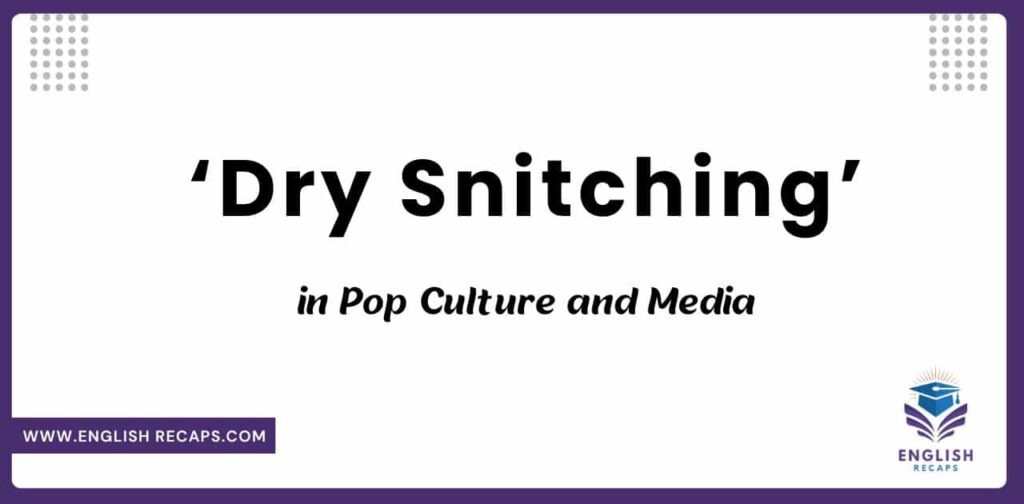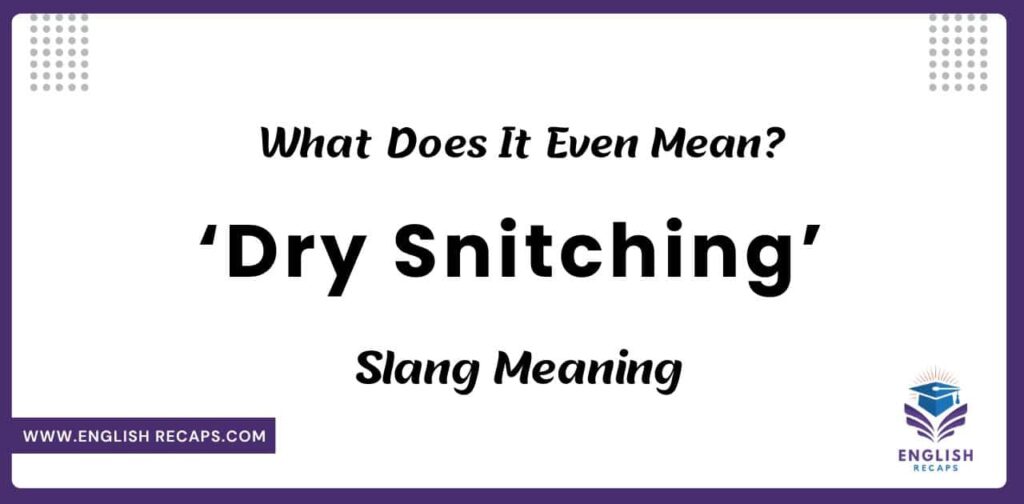Ever heard someone spill the beans without actually spilling them? That’s dry snitching in a nutshell.
But what does it really mean?
Dry snitching is when you rat someone out indirectly. It’s like telling on someone without actually saying their name. Sneaky, right?
Imagine your friend says, “I wonder why the boss is asking about long lunch breaks” right after you got back from a two-hour lunch. Yep, that’s dry snitching.
It’s not outright tattling, but it gets the job done. And it’s everywhere at work, in friend groups, even on social media.
Curious to learn more? Let’s dive in!
Understanding the Slang: What is ‘Dry Snitching’?
So, what’s the deal with dry snitching? Picture this: You’re at work, and your buddy Tom takes an extra-long lunch break. Instead of telling the boss outright, your coworker casually mentions, “Wow, the cafe must be packed today. Tom’s been gone for ages!” That, my friend, is dry snitching in action.
In essence, dry snitching is the art of informing on someone indirectly. It’s like dropping breadcrumbs of information that lead to someone else’s misdeed, all while maintaining an air of innocence. The ‘dry’ part? That’s because it’s done without the obvious moisture of direct accusation.
Here’s the breakdown:
- Indirect: No finger-pointing or naming names
- Subtle: Information is hinted at, not explicitly stated
- Passive-aggressive: The snitch often appears uninvolved
- Consequential: Can still lead to trouble for the subject
Dry snitching is the slang equivalent of saying, “I’m not saying it was Tom, but…” while raising your eyebrows suggestively. It’s a way to inform without seeming like an informant, to rat without being called a rat.
Origins of ‘Dry Snitching’: A Cultural Perspective
Now, where did this sneaky term come from? Like many slang expressions, dry snitching has roots in communities where trust is currency and loyalty is king.
The concept likely originated in environments where direct snitching could have serious consequences. Think prisons, tight-knit neighborhoods, or even high-pressure workplaces. In these settings, being labeled a snitch could be dangerous or socially devastating.
Dry snitching evolved as a way to navigate the thin line between maintaining group loyalty and addressing issues. It allowed individuals to bring attention to problems without directly accusing anyone, thus (theoretically) avoiding the ‘snitch’ label.
The term itself is relatively new in popular usage, gaining traction in the early 2000s. It’s part of a larger vocabulary around informing that includes words like:
- Rat: A long-standing term for an informant
- Grass: British slang for a snitch, dating back to the 1930s
- Narc: Originally meaning a narcotics officer, now used for any informer
As society has become more interconnected, especially with social media, the concept of dry snitching has seeped into mainstream culture. It’s no longer confined to specific communities but has become a recognized behavior in various social and professional settings.
‘Dry Snitching’ vs ‘Snitching’: Distinguishing the Differences
You might be wondering, “Isn’t all snitching the same?” Not quite! Let’s break down the key differences between traditional snitching and its drier counterpart.
Direct Tattletaling: Traditional ‘Snitching’
Traditional snitching is the straightforward approach to informing. It’s the classic “Teacher, Johnny stole my pencil!” scenario. Here’s what sets it apart:
- Explicit: The snitch directly names the person involved
- Clear intention: There’s no doubt about the aim to inform
- Immediate consequences: The subject is instantly implicated
- Overt action: The snitch takes a clear stance as an informant
In essence, traditional snitching leaves no room for ambiguity. The snitch is clearly identifiable, and their intentions are transparent.
The Indirect Approach: How ‘Dry Snitching’ Operates
Dry snitching, on the other hand, is the master of subtlety. It’s like leaving a trail of clues for someone else to follow. Here’s how it typically plays out:
- Indirect: Information is presented without naming names
- Subtle implications: Facts are hinted at rather than stated outright
- Plausible deniability: The dry snitch can claim innocence
- Delayed reaction: Consequences may not be immediate
Dry snitching often involves:
- Dropping hints in conversations
- Making vague social media posts
- Asking leading questions in front of authority figures
- Sharing partial information that prompts further inquiry
For example, instead of saying “Sarah cheated on the test,” a dry snitch might say, “I wonder how someone could score perfect when they were absent all week.” See the difference?
Don’t miss out to read this blog:
Newfound or New-Found or New Found? Understanding Regional Variations
Common Scenarios Where ‘Dry Snitching’ Occurs
Dry snitching isn’t confined to schoolyards or street corners. It can pop up in all sorts of situations. Let’s explore some common scenarios where you might encounter this subtle form of informing.
- The Workplace Whisper
Picture this: Your coworker, Alex, has been skipping out on team meetings. Instead of reporting it directly, another colleague casually mentions during lunch, “These meetings would be so much more productive if everyone attended regularly.” Boom! Dry snitching in action.
- The Social Media Sleuth
In the age of Instagram and Twitter, dry snitching has found a new playground. Someone posts a cryptic status: “Funny how some people claim to be busy but have time to party on a Tuesday night.” No names mentioned, but everyone knows who they’re talking about.
- The Family Fink
Even families aren’t immune. Imagine a sibling saying to mom, “I don’t know why the car has less gas. I haven’t driven it since Sunday.” This indirect comment might lead to questions about who used the car without permission.
- The Classroom Conundrum
In academic settings, dry snitching might sound like: “I’m surprised anyone could finish that impossible assignment so quickly.” This could prompt a teacher to investigate potential cheating.
- The Roommate Reveal
Living with others? You might hear something like, “The electricity bill is unusually high this month. I wonder if someone’s been using extra appliances.” A classic dry snitch move to address issues indirectly.
These scenarios show how dry snitching can occur in various aspects of our lives. It’s a tool people use to address issues or reveal information without seeming like the ‘bad guy.’ But is it always wrong? That leads us to our next point…
The Ethics of ‘Dry Snitching’: Is It Ever Justifiable?
Now we’re diving into murky waters. Is dry snitching ever okay? Or is it always a breach of trust? Let’s break it down and examine the ethical implications in different contexts.
Workplace Dynamics and ‘Dry Snitching’
In the professional world, dry snitching can be a complex issue. On one hand, it might seem like a way to address problems without creating direct conflict. On the other, it can erode trust and create a toxic work environment.
Pros of workplace dry snitching:
- Can bring attention to issues without confrontation
- Might protect the informer from retaliation
- Could address problems that are otherwise ignored
Cons of workplace dry snitching:
- Creates an atmosphere of suspicion
- Can damage team cohesion and trust
- May be seen as unprofessional or manipulative
Consider this scenario: You notice a coworker consistently missing deadlines, affecting the whole team. Instead of directly reporting it, you mention in a team meeting, “We seem to be falling behind on our project timelines lately.” Is this helpful problem-solving or undermining your colleague?
The answer often depends on the specific situation, company culture, and intentions behind the act. In some cases, it might be the only way to address issues in a hierarchical or conflict-averse workplace. In others, it could be seen as a cowardly way to avoid direct communication.
Social Settings and the Impacts of Informing Indirectly
Outside of work, dry snitching can have significant impacts on friendships and social dynamics. It’s often seen in gossip circles or among groups of friends dealing with conflicts.
Potential justifications for social dry snitching:
- Addressing harmful behavior without direct confrontation
- Protecting someone from danger or bad decisions
- Bringing attention to issues that affect the group
Negative impacts of social dry snitching:
- Breakdown of trust within friend groups
- Creation of a gossip-heavy environment
- Passive-aggressive problem-solving becoming the norm
Imagine your friend is dating someone you know is cheating. Instead of telling them directly, you might say, “I saw Alex at the bar last night. Weird that they said they were working late, right?” This could be seen as looking out for your friend or as stirring up trouble indirectly.
The ethics of dry snitching in social settings often boil down to intentions and outcomes. Is the goal to help or to create drama? Does it solve problems or just create new ones?
In both workplace and social contexts, the justifiability of dry snitching is rarely black and white. It requires careful consideration of the situation, potential consequences, and alternative approaches to addressing issues.
‘Dry Snitching’ in Pop Culture and Media

Dry snitching isn’t just a real-world phenomenon; it’s seeped into our entertainment and media landscape. From hip-hop lyrics to TV dramas, this subtle form of informing has become a recurring theme. Let’s explore how dry snitching is portrayed in popular culture and what it reveals about our society.
Music: The Beat of Betrayal
Hip-hop and rap music often touch on themes of loyalty and betrayal, making dry snitching a natural topic. Artists use lyrics to call out perceived snitches or warn against the practice.
For example, in his song “Snitch,” Obie Trice raps: “Now everybody wanna be police Dry snitchin’ on the low, that ain’t street”
These lyrics highlight the negative view of dry snitching in certain communities, equating it with betrayal and a lack of street credibility.
Television: Drama in the Details
TV shows, especially crime dramas and reality series, often feature dry snitching as a plot device. It’s used to create tension, reveal character motivations, or drive storylines forward.
In shows like “The Wire” or “Power,” characters often engage in subtle forms of informing, demonstrating the complex dynamics of loyalty and survival in high-stakes environments.
Social Media: The New Frontier of Indirect Informing
Platforms like Twitter and Instagram have become breeding grounds for dry snitching. Vague posts, subtweeting (posting about someone without mentioning their name), and strategic tagging can all be forms of digital dry snitching.
A typical social media dry snitch might look like: “Some people really show their true colors when they think no one’s watching 👀 #JustSaying”
This kind of post invites speculation and can indirectly call someone out without naming names.
Movies: The Big Screen Snitch
Films often use dry snitching as a way to build suspense or reveal character flaws. In mob movies or high school dramas, you’ll often see characters dropping hints or making suggestive comments to indirectly inform on others.
The prevalence of dry snitching in pop culture reflects its significance in real-life social dynamics. It’s a tool for storytelling, character development, and social commentary, highlighting the complex nature of human relationships and communication.
Sanskrit, often hailed as the language of the gods, is renowned for its rich literary heritage and complex grammatical structure. One of the fundamental aspects of Sanskrit grammar is the concept of “Shabd Roop.” Understanding Shabd Roop is essential for anyone delving into the intricacies of Sanskrit language and literature.
How to Respond If You’re a Victim of ‘Dry Snitching’
Finding yourself on the receiving end of dry snitching can be frustrating and confusing. You might feel betrayed, angry, or unsure how to address the situation. Here are some strategies to help you navigate these tricky waters:
Stay Calm and Assess the Situation
Before reacting, take a deep breath and evaluate what’s happening. Ask yourself:
- What exactly was said or done?
- Who might be behind the dry snitching?
- What could be their motivation?
Keeping a cool head will help you respond more effectively.
Gather Evidence
If possible, document instances of dry snitching. This could include:
- Screenshots of social media posts
- Notes about specific comments or incidents
- Witnesses who can corroborate your experience
Having concrete examples can be helpful if you need to address the issue formally.
Confront the Issue Directly (If Safe and Appropriate)
If you feel comfortable, consider addressing the dry snitch directly. Here’s how:
- Choose a private setting for the conversation
- Use “I” statements to express how their actions affect you
- Ask for their perspective and listen actively
- Set clear boundaries for future interactions
Remember, direct communication can often resolve issues more effectively than passive-aggressive responses.
Speak to a Higher Authority if Necessary
In workplace situations, if dry snitching is creating a hostile environment or affecting your performance, consider speaking to:
- Your supervisor
- Human Resources department
- A trusted mentor in the organization
Be prepared to explain the situation calmly and professionally, focusing on how it impacts your work.
Strengthen Your Position
Make it harder for others to dry snitch on you by:
- Being transparent about your actions and decisions
- Documenting your work and contributions
- Building strong relationships with colleagues and superiors
- Maintaining a positive reputation
Don’t Stoop to Their Level
It might be tempting to retaliate with your own form of dry snitching, but this often escalates the situation. Instead:
- Take the high road
- Focus on your own actions and integrity
- Let your work and character speak for themselves
Seek Support
Dealing with dry snitching can be emotionally draining. Don’t hesitate to:
- Talk to trusted friends or family members
- Seek professional counseling if the situation is causing significant stress
- Join support groups or online communities where you can share experiences and advice
Remember, being a victim of dry snitching doesn’t define you. By responding thoughtfully and maintaining your integrity, you can often turn these challenging situations into opportunities for personal and professional growth.
Don’t miss out to read this blog:
Annunciate vs Enunciate? What’s the Difference?
Navigating the Murky Waters of Dry Snitching
As we’ve explored, dry snitching is a complex social phenomenon that straddles the line between communication and manipulation. It’s a tool that can be used for various purposes, from addressing issues indirectly to stirring up drama.
Understanding dry snitching is crucial in today’s interconnected world. It helps us:
- Recognize when it’s happening to us or others
- Navigate social and professional situations more effectively
- Reflect on our own communication styles and intentions
Whether you’re dealing with a workplace whisper campaign or social media subtweeting, being aware of dry snitching empowers you to respond thoughtfully and maintain your integrity.
Remember, open and honest communication is often the best antidote to the subtle poison of dry snitching. By fostering environments of trust and direct dialogue, we can create spaces where indirect informing becomes unnecessary.
In Closing
Dry snitching is like tattling without actually saying names. It’s when you hint at someone’s wrongdoing without directly accusing them. This sneaky behavior pops up everywhere at work, with friends, and on social media. We’ve explored its meaning, origins, and how it differs from regular snitching. We’ve also looked at common scenarios, ethical issues, and its presence in pop culture. If you’re ever a victim of dry snitching, stay calm, gather evidence, and consider addressing it directly. Remember, clear communication is often the best way to handle these tricky situations. Understanding dry snitching helps us navigate social dynamics better and reflect on our own communication style.
In a world where the tech industry is expected to reach $5 trillion in 2023, many businesses struggle with common technology issues. Consumers often face obstacles like software glitches, cybersecurity threats, and IT support challenges. TechLeez emerges as a forward-thinking solution provider, dedicated to addressing these needs with a wide array of services. This guide will highlight TechLeez’s offerings, benefits, and how it stands out in a crowded market.
FAQ’s
What does dry snitching mean?
Dry snitching means indirectly informing on someone without explicitly naming them. It’s hinting at someone’s wrongdoing in a way that leads others to figure it out.
What does dry snitch mean in urban dictionary?
In urban slang, a dry snitch is someone who reveals information about others indirectly, often through subtle hints or comments, without openly accusing them.
Is snitch a bad word?
“Snitch” is often seen negatively, especially in certain communities. It implies betrayal of trust, though views on its severity can vary depending on context.
What is another word for dry snitching?
Other terms for dry snitching include indirect informing, passive-aggressive tattling, or subtle implication.
What does dry mean in slang?
In this context, “dry” suggests a lack of obvious moisture – meaning the snitching is done without the clear wetness of direct accusation.
What is dry snitching in Thug?
In street culture, dry snitching refers to indirectly giving information to authorities or rivals about someone’s illegal activities without explicitly naming them.
Meta Description: Uncover the sneaky world of dry snitching! Learn what it means, how to spot it, and why it matters in our everyday lives. #DrySnitch #SlangMeaning
Read More English Improving Related Interesting Blogs
Is It Correct to Say “Good Luck with Your Future Endeavors”?
What Does “Hi There” Mean and Should You Use It? Read Reason
Is It Correct to Say “How Is It Going?”: Understanding Casual American US English Greetings
Kase Abusharkh Amy Berry: A Journey Of Innovation And Inspiration
Is It Correct to Say “How Is It Going?”: Casual American US English Greetings


